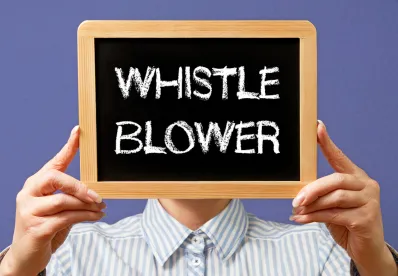SEC Whistleblower Awards Continue Mounting
Since April, the SEC has announced several more whistleblower awards—including its largest one yet.
On April 20, 2020, the SEC announced a $5 million award to a whistleblower who provided significant information that led to a successful enforcement action. According to the SEC, the award recipient provided critical evidence of wrongdoing, which helped save the SEC time and resources during the agency’s investigation. The whistleblower also suffered what the SEC characterized as a “unique hardship” as a result of raising concerns internally.
On April 28, 2020, the SEC announced an award of more than $18 million to a whistleblower whose “significant information” prompted an examination that resulted in an “important” SEC enforcement action. The SEC noted that the award recipient repeatedly reported the issue internally before contacting the SEC.
On May 4, 2020, the SEC announced an award of almost $2 million to an individual whose information and assistance helped the agency bring a successful enforcement action and allowed investors to recover most of their money. The SEC highlighted that the whistleblower’s information helped the SEC stop an ongoing fraud.
On June 4, 2020, the SEC announced the largest single whistleblower award it has made to date—$50 million. The individual award recipient provided detailed, firsthand observations of misconduct by a company that resulted in a successful enforcement action and the return of a significant amount of money to investors. The next largest amount the SEC has awarded was $39 million to an individual in 2018. Two recipients also shared a nearly $50 million award that same year.
On June 19, 2020, the SEC announced it awarded $700,000 to an individual who provided significant information that helped the SEC bring a successful enforcement action. The SEC emphasized that this whistleblower reported the problem internally before contacting the SEC in an effort to remedy the conduct. This award recipient also provided continued assistance throughout the SEC’s investigation.
On June 23, 2020, the SEC announced a $125,000 award to an individual whistleblower whose information and assistance helped both the SEC and another agency bring successful actions against the perpetrator of a fraudulent securities offering. The SEC noted in its announcement that the information the whistleblower provided helped stop an ongoing fraud that targeted a “vulnerable investment community.”
On July 14, 2020, the SEC announced it awarded $3.8 million to an individual who provided significant information that helped the SEC disrupt an ongoing fraud. The SEC’s enforcement action resulted in millions of dollars being returned to harmed investors.
CFTC Pays $6 Million and $2 Million in Whistleblower Awards
On June 9, 2020, the Commodity Futures Trading Commission announced its award of more than $6 million to an individual who voluntarily provided information that led the CFTC to bring a successful enforcement action. The CFTC emphasized in its announcement that the individual provided “specific, credible and timely” original information, leading the CFTC to open its investigation and initiate the enforcement action. In its Order, the CFTC further highlighted that the award recipient provided information even though he or she “was not under any legal obligation to report” to the CFTC. The CFTC otherwise denied four other claimants’ applications for whistleblower awards without comment.
On May 4, 2020, the CFTC announced another whistleblower award exceeding $2 million to be shared among four whistleblowers. This award was granted for both a CFTC action and related actions brought by another regulator. The CFTC specifically recognized the significant contributions of the four award recipients, highlighting that they jointly submitted a tip to the CFTC. Each recipient also individually provided “significant, ongoing assistance” to the CFTC’s Division of Enforcement, and together, “synthesized information for the CFTC that highlighted the economic impact of the suspicious activity they identified.”
Federal Legislators Introduce COVID-19 Whistleblower Protection Bill
In mid-June, Senator Kamala Harris and Representatives Jackie Speier and Jamie Raskin introduced the COVID-19 Whistleblower Protection Act. The act seeks to provide legal protections for employees who report employers who misuse federal funds received through various measures enacted by Congress aimed at mitigating the impacts of the COVID-19 pandemic.
If passed, the act would prohibit employers from taking “reprisals” against “protected individuals” for “disclosing, being perceived as disclosing, or preparing to disclose…to an officer or entity [designated under the act] information that the protected individual reasonably believes is evidence of misconduct that violates, obstructs, or undermines any statute, rule, or regulation with respect to any coronavirus pandemic-related program, project, or activity.” The misconduct referred to in the act includes, but is not limited to, dangers to public health or safety, gross mismanagement of agency contracts, grants, and covered funds, and abuse of authority. The act also would prohibit employers from retaliating against any “protected individuals” who refuse to obey any directive that the employee “reasonably believes would require that individual to violate a statute, rule, or regulation with respect to any coronavirus pandemic-related program, project, or activity.”
The act defines “reprisal” as “an action (or, as applicable, inaction) that is discharging, demoting, blacklisting, or acting or failing to take an action in a manner prejudicial against, or otherwise discriminating against in any way (including in the hiring process and including by the threat of any such action or inaction) a protected individual.” The act defines “protected individuals” expansively to include employees, former employees, and employment applicants. The act also expansively defines individuals who are considered “employees” for its purposes as “individual[s] performing services on behalf of an employer, including…individual[s] working for an employer under a contract with such employer (including [] contractor[s], subcontractor[s], or agent[s] of an employer).”
The act defines “coronavirus pandemic-related program, project, or activity” as a “program, project or activity of the executive branch…authorized or carried out using amounts made available under an act to respond to or provide aid or assistance to address, relief from, or funding to address the outbreak of COVID-19 that is enacted before, on, or after the date of enactment of this act.” This includes programs, projects, or activities that are funded by: (i) the Paycheck Protection Program and Health Care Enhancement Act; (ii) the CARES Act; (iii) the Families First Coronavirus Response Act; or (iv) the Coronavirus Preparedness and Response Supplemental Appropriations Act of 2020.
The act provides that officers and entities to whom protected individuals can report include the Pandemic Response Accountability Committee, an inspector general (including the Special Inspector General for Pandemic Relief), the Congressional Oversight Commission, the Comptroller General of the United States, a member of Congress, a congressional committee, a state or federal regulatory or law enforcement agency, and an individual with supervisory authority over a protected individual.
Under the act, protected individuals who believe they have suffered one or more reprisals as defined under the act may submit a complaint to the U.S. Department of Labor within three years after learning of the retaliation. The employer would then be provided with 60 days to respond to the complaint. In evaluating complaints brought under the act, the Secretary of Labor would be required to determine whether the complaining party’s disclosure or protected activity was a contributing factor in the alleged retaliation. If the Secretary of Labor does not issue a final decision within 180 days of the filing of the complaint, the complaining party would be allowed to bring an action in federal court. The act also provides protected individuals with the right to a jury trial. Protected individuals who prevail on their claims brought under the act will be entitled to relief including reinstatement, compensatory damages, liquidated damages for double back pay, and attorneys’ fees and costs. Pre-dispute arbitration agreements that require arbitration of disputes under the act are invalid and unenforceable.
We will provide updates on the status of this legislation, which is currently in the earliest stages of the legislative process.
Texas Federal Court Dismisses a SOX Whistleblower Case for Lack of Employment Relationship
In a June 12, 2020, decision, a federal district court in Texas dismissed purported SOX whistleblower retaliation claims because the alleged whistleblower was not an employee of the defendant, as SOX requires. The plaintiff was a contractor and advisory board member of the defendant – neither of which is an employment relationship sufficient for SOX whistleblower retaliation liability.
The plaintiff claimed that he was retaliated against by the defendant company after he complained about the company’s purported SEC violations and brought a related shareholder-derivative lawsuit. More specifically, the plaintiff claimed the company retaliated against him when it removed him from his position as an advisory board member, canceled contracts with his insurance company, and announced the termination of an office lease in one of his company’s buildings. The defendant company argued the plaintiff’s claims should be dismissed because the plaintiff was not a company employee and, therefore, not covered by SOX whistleblower retaliation protections. The plaintiff responded that as a company advisory board member, and as an insurance agent selling insurance for and on behalf of the company, the plaintiff was an employee protected by SOX.
The plaintiff cited the U.S. Supreme Court’s 2014 decision in Lawson v. FMR, which extended SOX’s protections to include not only employees of public companies, but also potentially employees of contractors and subcontractors who perform work for the public company. The district court disagreed with the plaintiff, and emphasized in its decision that an employer-employee relationship is an “essential element” of a retaliation claim. The district court reasoned that, without providing further factual support, the plaintiff’s allegation that he was the “functional equivalent of an employee” in his roles as an “agent, contractor, or subcontractor” of the defendant was not enough to support a SOX whistleblower retaliation claim. The court also found that the plaintiff’s role as an advisory board member was insufficient to establish an employment relationship with the defendant because a corporate director is not, by virtue of his or her position, an employee.
The case is Moody v. American National Insurance Co., No. 3:19-cv-00206, in the U.S. District Court for the Southern District of Texas (June 12, 2020).






 />i
/>i
